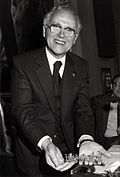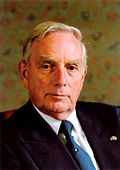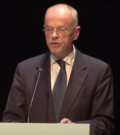List of presidents of the Senate since 1929
| President of the Senate | Term of office | Party | Parliamentary Period | ||
|---|---|---|---|---|---|
 | Baron Willem Lodewijk de Vos van Steenwijk (1859–1947) | 17 September 1929 – 23 July 1946 (16 years, 309 days) [Ret] | Christian Historical Union | 1929–1932 | |
| 1932–1935 | |||||
| 1935–1937 | |||||
| 1937–1946 | |||||
 | Dr. Roelof Kranenburg (1880–1956) | 23 July 1946 – 1 June 1951 (4 years, 313 days) [Res] | Free-thinking Democratic League | 1946–1948 | |
| Labour Party | 1948–1951 | ||||
 | Jan Jonkman (1891–1976) | 1 June 1951 – 20 September 1966 (18 years, 111 days) [Ret] | Labour Party | ||
| 1951–1952 | |||||
| 1952–1955 | |||||
| 1956–1960 | |||||
| 1960–1963 | |||||
| 1963–1966 | |||||
 | Dr. Jan Mazure (1899–1990) | 20 September 1966 – 16 September 1969 (2 years, 361 days) [Ret] | Labour Party | 1966–1969 | |
 | Maarten de Niet Gerritzoon (1904–1978) | 16 September 1969 – 18 September 1973 (4 years, 2 days) [Res] | Labour Party | 1969–1971 | |
| 1971–1974 | |||||
 | Dr. Theo Thurlings (1916–1997) | 18 September 1973 – 13 September 1983 (9 years, 360 days) [Ret] | Catholic People's Party | ||
| 1974–1977 | |||||
| 1977–1980 | |||||
| Christian Democratic Appeal | 1980–1981 | ||||
| 1981–1983 | |||||
 | Dr. Piet Steenkamp (1925–2016) | 13 September 1983 – 11 June 1991 (7 years, 271 days) [Ret] | Christian Democratic Appeal | 1983–1986 | |
| 1986–1987 | |||||
| 1987–1991 | |||||
 | Herman Tjeenk Willink (born 1942) | 11 June 1991 – 11 March 1997 (5 years, 273 days) [App] | Labour Party | 1991–1995 | |
| 1995–1999 | |||||
 | Frits Korthals Altes (1931–2025) | 11 March 1997 – 2 October 2001 (4 years, 205 days) [Res] | People's Party for Freedom and Democracy | ||
| 1999–2003 | |||||
 | Gerrit Braks (1933–2017) | 2 October 2001 – 10 June 2003 (1 year, 251 days) [Ret] | Christian Democratic Appeal | ||
 | Yvonne Timmerman-Buck (born 1956) | 17 June 2003 – 6 October 2009 (6 years, 111 days) [App] | Christian Democratic Appeal | 2003–2007 | |
| 2007–2011 | |||||
 | René van der Linden (born 1943) | 6 October 2009 – 28 June 2011 (1 year, 265 days) [Rel] | Christian Democratic Appeal | ||
 | Fred de Graaf (born 1950) | 28 June 2011 – 2 July 2013 (2 years, 4 days) [Res] | People's Party for Freedom and Democracy | 2011–2015 | |
 | Ankie Broekers-Knol (born 1946) | 2 July 2013 – 11 June 2019 (5 years, 344 days) [App] | People's Party for Freedom and Democracy | ||
| 2015–2019 | |||||
 | Dr. Jan Anthonie Bruijn (born 1958) | 2 July 2019 – 5 September 2025 (6 years, 65 days) [App] | People's Party for Freedom and Democracy | 2019–2023 | |
| 2023–2027 | |||||
 | Mei Li Vos | 7 October 2025 | Labour Party | ||
- Resigned
- Retired
- Not re-elected
- Appointed as Vice-President of the Council of State
- Appointed as Member of the Council of State
- Appointed as State Secretary for Justice and Security
- Appointed as Minister of Health, Welfare and Sport
